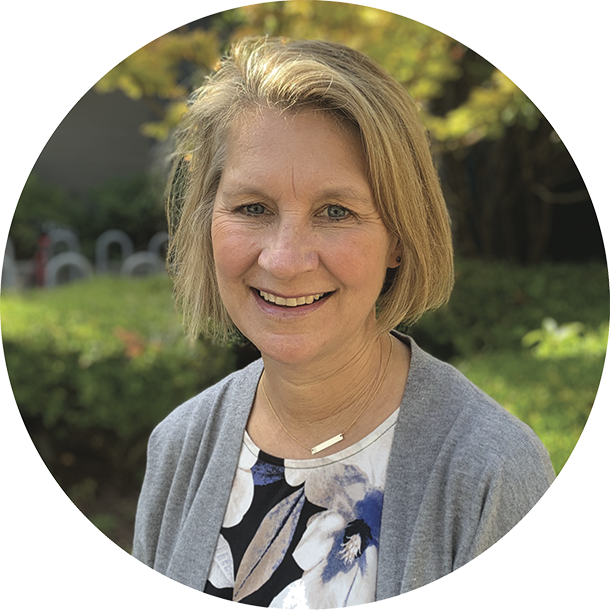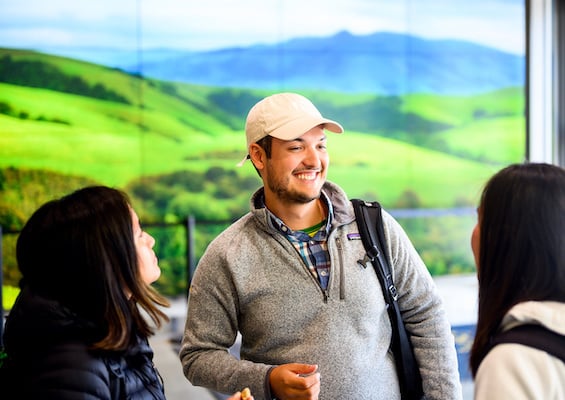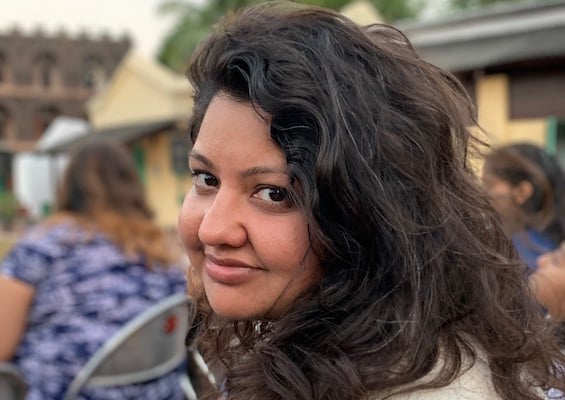This is the first post in an occasional series featuring women who are leading innovation, growth, and success across multiple industries. We start with two Haas alumnae making an impact in the food industry and how the Berkeley MBA helped them get where they are today.
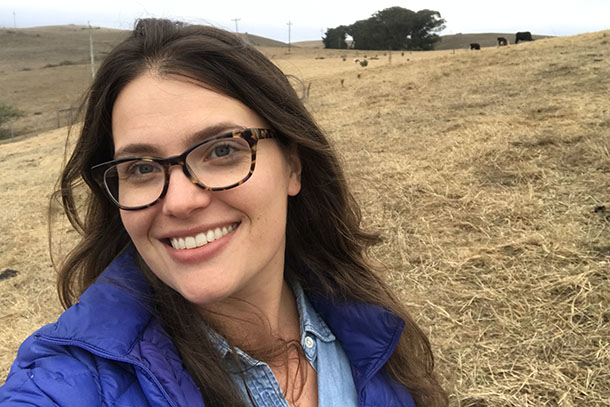
As Managing Director at Cowgirl Creamery, Amanda Parker, MBA 18, leads the business’ strategic growth, providing vision and leadership to the company’s production, distribution, retail and direct-to-consumer teams. Founded in 1997 in Point Reyes Station, California, Cowgirl Creamery now sells its cheeses and dairy products to more than 500 stores, farmers markets, and restaurants nationwide.
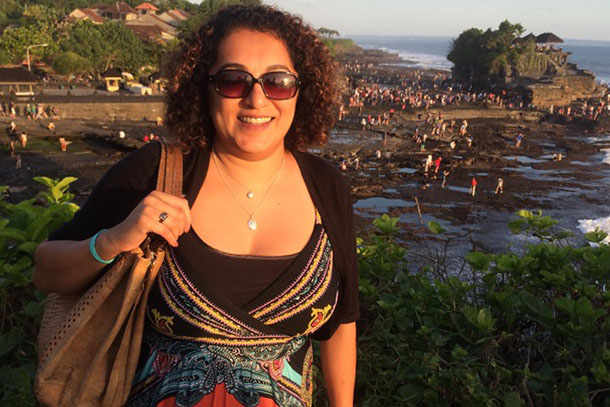
Anita Ratnathicam, EMBA 16, Food Program manager at Google, oversees the food spaces in Sunnyvale, including cafés, micro kitchens, and hubs. She also helps set the strategy for continuing to nourish the company’s employees as Google grows worldwide.
What is it about the food industry that is so compelling to you?
Anita (Google): Food touches everyone. We all eat and have emotional connections to food. In addition, the food system is far-reaching, providing jobs for many and having integral links to the environment.
Amanda (Cowgirl Creamery): Food is part of how we show love and how we show up in the world whenever we break bread. The food business is universal, global. For me, it is both a personal and a professional passion.
How well are women represented in the food industry and in which capacities?
Amanda: The cheese industry specifically has long had good female representation. Historically, many women—especially those who helped kick-start the American artisan cheese revolution in the 1970s and 1980s—started making artisan cheese to feed their families. For example, in the cheese industry, a group we affectionately call the “goat ladies” started making cheese to provide their families with alternatives to cow’s milk cheeses, and at a higher quality level than they could find in the supermarket.
Anita: Like many industries, there is a lot of representation at the ground level and a drop off in leadership roles. Approximately 42% of line-level employees in food service are women, yet 71% of leadership roles are held by men. Lately, the issue of sexual harassment and inequality in the food system as a whole has gained attention, which is hopefully the beginning of a better environment for women to continue careers in this area.
Amanda: As in many industries, building a pipeline for women to be able to move into management positions is a challenge. Cowgirl Creamery was founded by two women, and our leadership team is predominately women. However, we recently became part of the Emmi Group, a global, publicly traded Swiss dairy company, where management is mostly male. I feel proud to be one of the few female managing directors among my executive peers across 14 countries.
Haas puts a stake in the ground that says you are here to learn about yourself as a leader, not to fit into a mold.”
You’ve both moved from smaller organizations to very large ones. How has that affected your responsibilities?
Anita: One of the advantages of being director of operations at Good Food Guys—which many will recognize as the people behind Mixt and Split—was that we could be nimble and scrappy. Larger companies move more slowly because you need time to create alignment with stakeholders. The flip side, of course, is that you have a lot more resources. The most fun part of my job is looking at ways to have a large-scale impact on the food system, as a whole.
Amanda: I describe my role as being the shepherd of the changes that come with being part of a global company. A degree of tension is inherent to growth. We are in the midst of finding a way to bridge and maintain the culture at Cowgirl while still growing our scale. The opportunities and challenges are melded together. And Anita is right, more access to resources is one of the positive changes.
What prepared you for the job you have now? Who were your mentors?
Anita: During my 10 years as regional restaurant manager at Nordstrom, I benefited from many great role models. I learned from observing them and being thoughtful about their actions, making note of what works and what doesn’t. By and large, we learn when we stumble; you acknowledge that and push forward.
Amanda: I agree with that. It’s a day-by-day experience, and we’re all still learning. If I make 10 mistakes a day and learn 10 new things, that is a good day. There is a constant need for humility and curiosity, to be a Student Always, really. As to mentors, strong women—my mother, for a start! Certainly Sue Conley and Peggy Smith, the original Cowgirls. I look for advice from a range of friends, classmates—whoever will be the most helpful in a given situation and offer a broad array of perspectives.
Anita: Former bosses, my peers, and classmates have all shared their secret sauce at one point or another.
You both mentioned classmates. How strong is the Berkeley Haas network?
Anita: My classmates are my personal board of directors. We’re still very close and connected.
Amanda: I often use my commute time to get in touch with classmates, to give a shout-out or ask a question. This provides me with both trusted sounding boards and opportunities to positively impact Cowgirl Creamery and Tomales Bay Foods, my own business through my network. For example, I have a classmate who is working in regenerative organic agriculture right now, and it’s an area my company is continuing to develop further. Being able to not only have thought partners but actual industry experts is one of the best parts of what Haas gave to me in friends and colleagues.
What advice would you give people aspiring to leadership in the food industry?
Anita: My rule of thumb applies in any industry: Be the best at the job you have; show people what you are capable of and good things will come.
Amanda: Lead with authenticity. When I started my MBA studies, I thought leaders had to be strong and unflappable. At Haas, I was able to challenge those expectations and rebuild how I wanted to shape my own leadership style. I’m now better prepared to balance the quantitative, qualitative, and emotional aspects of leadership in my own way. Or, put another way, the strong, goofy, and vulnerable parts of my personality. I’m not afraid to be firm, and I’m not afraid to sing showtunes to my sales team to make them laugh.
Anita: I agree. Haas puts a stake in the ground that says you are here to learn about yourself as a leader, not to fit into a mold. I pushed past the impostor syndrome hesitation to understand my place as a leader. Having the space and support to explore yourself in a place of psychological safety is the real return on investment.
What gives you the most satisfaction in your role?
Anita: Being surrounded by a group of smart, passionate, driven individuals and collaboratively solving wicked problems. Google is an incredible organization as far as the things they are doing for good in the world. I’m looking forward to contributing to that effort.
Amanda: What’s most exciting to me right now is developing our people. Cowgirl Creamery is in a new phase of growth. I get fired up thinking about what that means from a representation perspective and being able to educate, teach new skills, give new opportunities, and expand the commitment that we have to our people.





